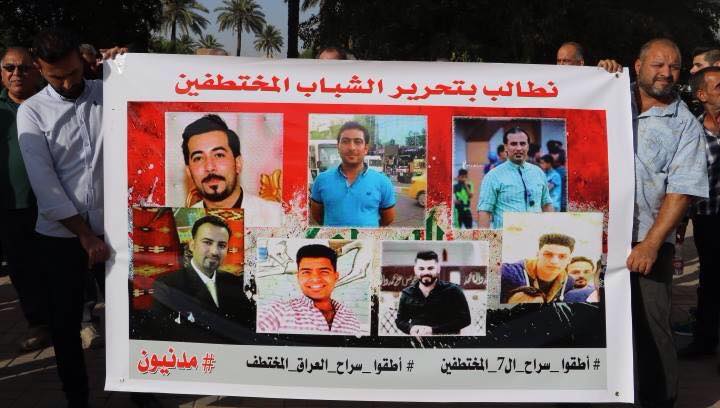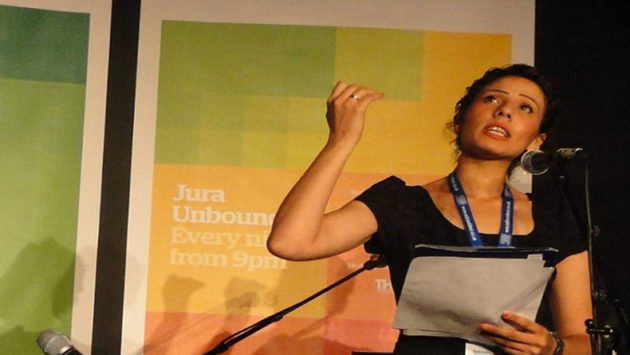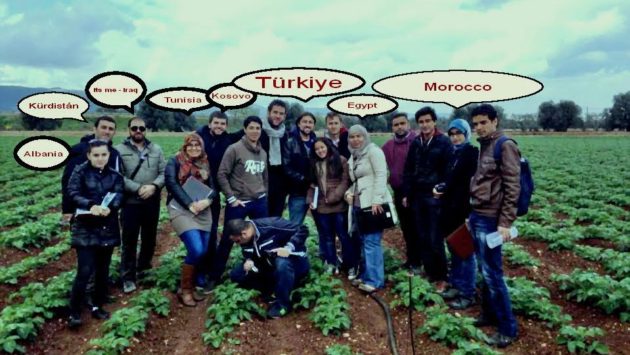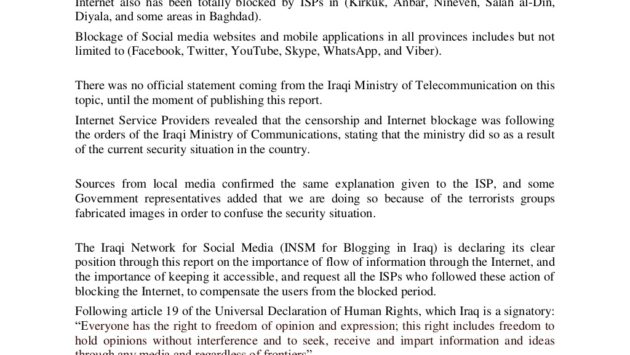Civil Society Demands Accountability for the Kidnapping and Torture of 7 Students in Baghdad – International Solidarity Needed Now

Very early in the morning of May 8th, an armed group wearing civilian clothes and driving an SUV with tinted windows abducted seven university student activists from their apartment in Al-Bataween, an area of central Baghdad. The students were taken to an unknown destination. Iraqi civil society organizations responded with outrage on social networking sites and organized protest demonstrations. This rapid, concerted response was likely crucial to securing the students’ timely release the following day. However, no decisive steps have yet been taken to hold those who kidnapped the students accountable.
While the adviser to the Ministry of the Interior, Wahab al-Taee claimed, “The seven young men returned to their families unharmed after sustained efforts by the Interior Minister and a special team managed to secure their release,” in fact several of the young men were beaten and tortured. One of them, who sustained significant injuries, agreed to have his bruises and wounds photographed.

The seven students are all regular participants in the peaceful, protests in Tahrir Square, that have been taking place weekly since August 2015, to demand political reforms and an end to the government corruption that is squandering Iraq’s wealth. One student is a journalist working for the newspaper of the Iraqi Communist Party and others are activists in the party’s left-wing student union. Some of them have published criticism of the militias and political authorities on Facebook; others have strongly denounced the religious marches and activities that occupy the Iraqi public and divert attention from the reform and development of Iraq. The students, who are from cities in southern and central Iraq, all study in Baghdad and share an apartment in the center of the city.
Following their release, the students held a press conference, where they revealed the details of their abduction and beatings. They described being insulted by the kidnappers who, they said, had extensive knowledge of their lives and activities. The kidnappers questioned the students at length about the goals of the protests. Then on the second day, as external pressures on the kidnappers to release the students grew, the kidnappers changed their attitude and talked more about the larger Arab world, and even joked a bit, in order to lighten the atmosphere. They released the students late at night on Tuesday May 9th and left them in the Taji area of Baghdad around 12:10 am on May 10th. Despite their release, the students were still obviously very frightened. They described how the kidnappers had threatened them about participating in the demonstrations or posting criticisms of the militias on Facebook.
Government officials have so far said nothing about who was responsible for the kidnappings and torture. Prime Minister Haider al-Abadi reported in his weekly press conference that the kidnappers were filmed by cameras in Al-Bataween and that the government had important details about the operation; al-Abadi said that such efforts to intimidate activists were wrong and that Iraqi citizens’ right to express their opinions is guaranteed by the Iraqi constitution. An Interior Ministry spokesman, Saad Maan, said the Ministry is currently analyzing photos of the kidnappers in order to identify, apprehend, and hold them accountable.
Jassem al-Helfi, a leading figure in the anti-corruption demonstrations, denounced the students’ kidnappings as “an attack on freedom of expression and a move aimed at instilling fear in the population and snuffing out the protest movement. But,” al-Helfi declared, “this is a national cause and it will not be silenced….Such acts will only increase the determination of the demonstrators.” The ongoing protests, for reform and change, ending corruption, and fighting ignorance and absenteeism, have attracted many Iraqi youth and university students in particular.
Government corruption is a huge challenge in Iraq. Transparency International ranks the nation 166 out of 176 in its corruption index. However, those who protest and call for change do so at the risk of being threatened, tortured, or kidnapped by militias, many of which have direct links to parliamentarians and government ministers. Indeed, this is not the first time that young protesters have been abducted. Kidnappings are usually carried out by armed groups or militias, which have a great deal of freedom to move around Baghdad because of their influence over security services in the capital, which effectively puts the militias above the law. Protesters and human rights defenders are demanding that the government eliminate these groups that move about freely with weapons, carrying out kidnappings and threats in broad daylight.
The “Alliance of Article 38,” an organization of Iraqi activists, issued a statement expressing relief at the release of the seven students – Ahmed Naeem Rowaie, Haidar Nashi Hassan, Ali Hussein Shnawa, Samer Amer Moussa, Abdullah Latif Faraj, Zaid Yahya and Hamza Younis – and thanking the media, activists, government officials, and all who helped to save their lives. They went to call on concerned authorities, namely the Prime Minister and the Commander-in-Chief of the Armed Forces, to reassure civil society and the general public that the government and its security services are able to provide protection to civilians by putting an end to armed groups and taking concrete measures to keep weapons exclusively in the hands of state officials. The Alliance insisted that the kidnappers must be brought to justice and systematic campaigns led by extremists to target activists must end. “We call upon all activists, intellectuals, media professionals, and academics to continue to work in support of all efforts to put an end to these crimes and acts of intimidation. We are determined to continue our diverse, peaceful activism … and not to retreat,” the Alliance concluded.
In support of all nonviolent Iraqi activists and protests, the Iraqi Civil Society Solidarity Initiative calls on the Human Rights Office of the United Nations Assistance Mission for Iraq (UNAMI) and the European Union Mission in Baghdad, to demand that the Iraqi government work to hold the individuals who kidnapped and tortured the seven students accountable for their crimes, in accordance with Iraqi law. Neither the international community nor the United Nations should ignore the risks faced by human rights defenders in Baghdad, just meters from Baghdad’s Green Zone. International human rights activists must stand in solidarity with the demands for accountability and Iraqi citizens’ right to peaceful protest.




